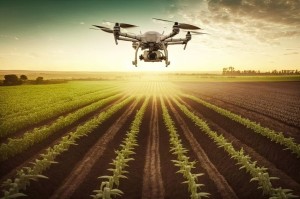 At Spinner Ag, our steadfast commitment to industry expertise and best business practices compels us to explore and harness the power of cutting-edge technology. The incorporation of drones, or unmanned aerial vehicles (UAVs), into modern agriculture is a testament to this commitment. This blog post aims to shed light on the burgeoning role of drones in enhancing agricultural productivity and paving the way towards a future of precision agriculture.
At Spinner Ag, our steadfast commitment to industry expertise and best business practices compels us to explore and harness the power of cutting-edge technology. The incorporation of drones, or unmanned aerial vehicles (UAVs), into modern agriculture is a testament to this commitment. This blog post aims to shed light on the burgeoning role of drones in enhancing agricultural productivity and paving the way towards a future of precision agriculture.
Unfolding the Potential of Drones
Drones offer an exciting avenue for transforming agricultural practices. They make farming more efficient, accurate, and environmentally sustainable, reinforcing our commitment to offering our customers notable cost savings while upholding eco-friendly standards.
A Bird’s Eye View of Crop Health
The potential to view immense tracts of land from a unique aerial perspective is one of the main advantages of drones. Equipped with infrared cameras, these flying marvels can monitor crop health by evaluating differences in heat signature and light absorption, traits that are strongly correlated with plant health. This enables farmers to intervene at an early stage, should any health issues be detected, saving crops that might otherwise be lost.
Efficient and Precise Crop Spraying
The smart application of liquid treatments is another area where drones shine. Traditional spraying methods can be wasteful, with much of the product not reaching the target area. In contrast, drones can ensure efficient and precise delivery of pesticides, herbicides, and fertilizers, without affecting untargeted areas, reducing chemical use and environmental impact.
Aid in Irrigation Management
Drones equipped with multispectral imaging sensors can evaluate water stress in crops, helping farmers optimize irrigation strategies. By identifying areas that are under-watered or overwatered, farmers can minimize water usage and improve crop performance.
Data Analysis and Decision-Making
Last but not least, drones provide actionable data for improved agricultural decision-making. The information gathered from drone flights can guide vital decisions related to planting, fertilizing, irrigation, and pest control, all while saving valuable time.
Future Considerations
However, like all new technological advancements, the use of drones in agriculture comes with some challenges. There’s the need for regulatory clarity on drone usage, as well as the requirement for technical know-how by the operators. It’s also essential to synergize drone technology with other farming practices for maximum benefit.
At Spinner Ag, we’re excited about the possibilities that drone technology opens up for agriculture. We understand that innovations like these could revolutionize the way we support our partners and customers. By making agriculture more precise, efficient, and eco-friendly, we’re not only improving food production, we’re echoing Spinner Ag’s mantra of commitment to long-lasting business relationships through reliability and industry expertise.
The rise of drones in agriculture signals an exciting juncture – an era where technology and traditional knowledge work together, offering farming communities a guiding light towards sustainable and prosperous operations. Together with our clients and partners, we’re here to navigate this journey into the future of agriculture – from sourcing hard-to-find products, ensuring competitive pricing, to providing industry-leading advice.
In the world of Spinner Ag, technological innovation isn’t merely a buzzword – it’s a way of life. Stay tuned for more insights as we chart the course of agricultural technology and its impact on the industry.